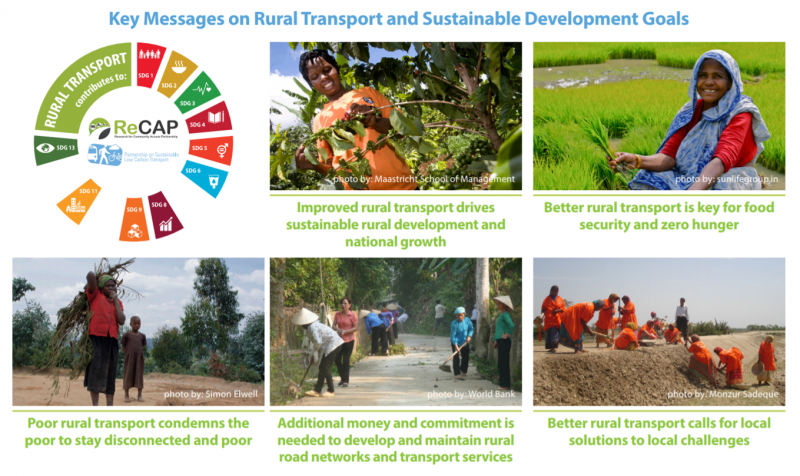ReCAP and SLoCaT Release Factsheet and Supporting Paper on the Critical Role of Rural Transport to Achieve the Sustainable Development Goals

A factsheet and a supporting paper have been developed in the framework of the UKAid funded Research for Community Access Partnership (ReCAP), facilitated by the Partnership on Sustainable, Low Carbon Transport (SLoCaT) on a set of key messages on rural transport and Sustainable Development Goals.
Rural transport plays an indispensable role in achieving more than half of SDGs and fulfilling the promise of the 2030 Agenda for Sustainable Development to ‘leave no one behind’. The provision of safe, reliable, and affordable rural transport infrastructure and services is essential to facilitate rural access to markets, services, enterprise and employment opportunities, the delivery of health and education, to increase agricultural production, to develop modern supply chains for crop delivery, to prevent food loss, and hence achieving zero hunger and alleviating poverty. Rural transport is indeed an essential rural facilitator for SDG fulfilment.
To underscore the critical role of rural transport in achieving the SDGs, a set of key messages has been developed in the framework of the UKAid funded ReCAP, facilitated by the SLoCaT Partnership, to explain how rural transport plays a key role in realizing the SDGs. The key messages are:
1. Improved rural transport drives sustainable rural development and national growth
2. Better rural transport is key for food security and zero hunger
3. Poor rural transport condemns the poor to stay disconnected and poor
4. Additional money and commitment is needed to build and maintain rural road networks and develop sustainable rural transport services
5. Better rural transport calls for local solutions for local challenges
 The factsheet gives an overview of the rationale behind each of the five key messages along with five to six facts and examples to show how successful scaled-up implementation of rural transport will contribute to realizing SDG 1 to alleviate poverty; SDG 2 to achieve zero hunger and ensure food security; SDG 3 to ensure health and well-being; SDG 4 to provide access to education; SDG 5 to empower women in rural areas; SDG 6 to facilitate access to clean water and sanitation; SDG 8 to promote inclusive growth and economic opportunities; SDG 9 and SDG 11 to contribute to sustainable infrastructure and communities for all; and SDG 13 to increase climate resilience and adaptation in rural areas.
The factsheet gives an overview of the rationale behind each of the five key messages along with five to six facts and examples to show how successful scaled-up implementation of rural transport will contribute to realizing SDG 1 to alleviate poverty; SDG 2 to achieve zero hunger and ensure food security; SDG 3 to ensure health and well-being; SDG 4 to provide access to education; SDG 5 to empower women in rural areas; SDG 6 to facilitate access to clean water and sanitation; SDG 8 to promote inclusive growth and economic opportunities; SDG 9 and SDG 11 to contribute to sustainable infrastructure and communities for all; and SDG 13 to increase climate resilience and adaptation in rural areas.
 A paper has also been developed to provide research evidence from a wide range of authoritative sources in support of the five key messages. The paper argues that the key messages can drive short-term advocacy for the need to allocate more financial and human resources to improving rural transport infrastructure and services, and can additionally form the basis of a long-term research agenda to build further evidence on ways to increase rural access and to create lasting institutional change through uptake and embedment of this evidence.
A paper has also been developed to provide research evidence from a wide range of authoritative sources in support of the five key messages. The paper argues that the key messages can drive short-term advocacy for the need to allocate more financial and human resources to improving rural transport infrastructure and services, and can additionally form the basis of a long-term research agenda to build further evidence on ways to increase rural access and to create lasting institutional change through uptake and embedment of this evidence.
For more information, please visit: www.slocat.net/ruraltransport or www.research4cap.org.
———————
The Partnership on Sustainable, Low Carbon Transport, in partnership with, and support of the UK Aid-funded Research for Community Access Partnership, promotes sustainable rural access as a viable component of the implementation strategies for achieving SDG and to ensure its inclusion in the high-level, multi-lateral development discourse on sustainable transport and rural development. For more information, please visit www.slocat.net/ruraltransport.